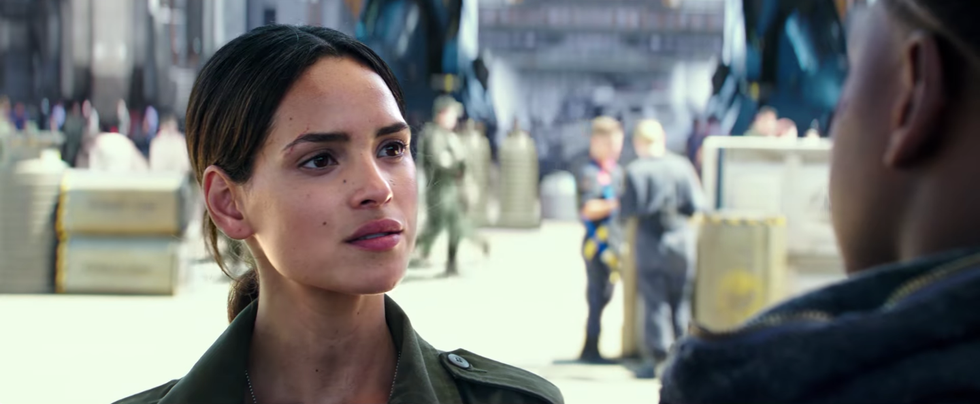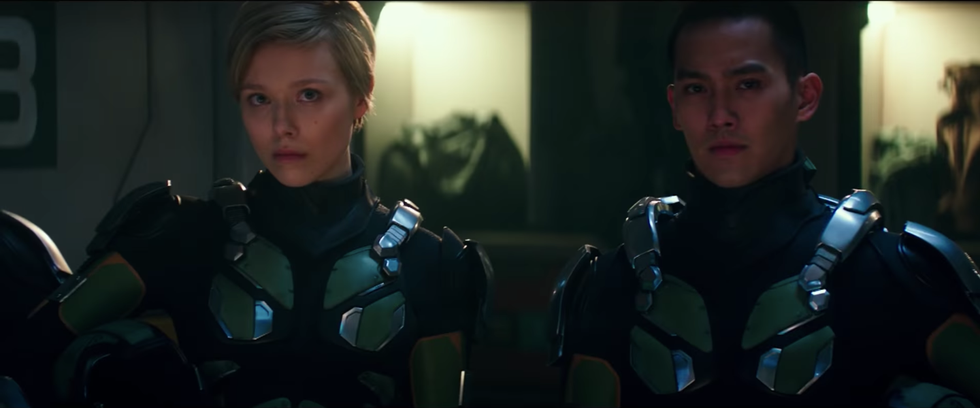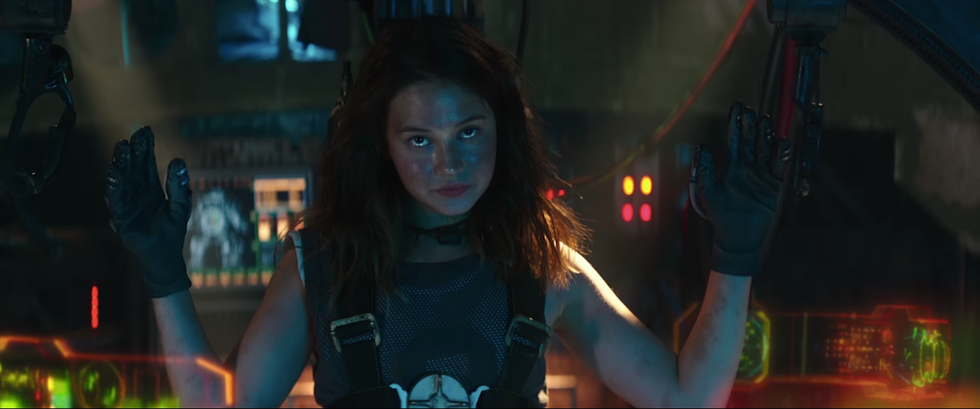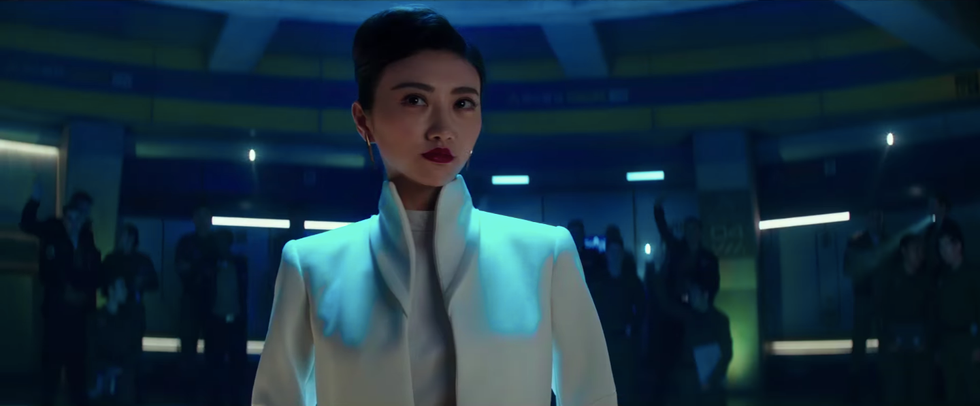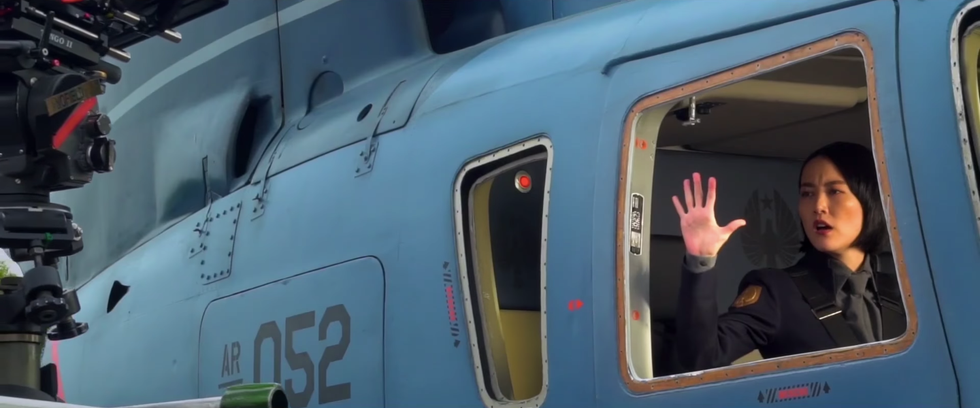When Pacific Rim came out in 2013, a large part of the reason it was received so well was the specificity of its characters. Every character, even those with the least screen time, is given attention and detail by the direction and design surrounding them. After the film's release, one character in particular stood out, though: Mako Mori.
Mako was an incredible departure from the mainstream leading ladies of past action and adventure films. Rather than the fiery mystery girl that seems to populate all action films as the supporting role to the leading man, she was a fully developed, intricately woven character whose character arc was at the heart of the movie. She was, in truth, the main character of Pacific Rim, with her male co-lead, Raleigh Becket, acting as the film's Point of View.
Some weak criticism of that first film, though, brought up the fact that Pacific Rim does not pass the Bechdel Test, a test often used to determine the strength of female characters in film by asking that 1) at least two female characters 2) talk to each other 3) about something other than a man.
However, the Bechdel Test was never designed to examine female characters. Rather, it was supposed to expose how little lesbians can relate to the majority of films, since women so rarely interact in a meaningful manner.
As a result, a character can pass the Bechdel Test through a simple exchange with another woman, but still be a weak character. And Mako Mori, who failed the Bechdel Test, was, very clearly, not a weak character.
So, a new test sprouted up: the Mako Mori Test, which simply asked that a female character go through her own character arc rather than supporting a man's. Suddenly, the majority of the movies that passed the Bechdel Test fell away.
Pacific Rim: Uprising just came out last week, and while it is a film that is populated by women and certainly passes the Bechdel Test, do any of those women pass the test that their predecessor created?
Jules Reyes
Of all of the women in this movie, Jules fails the Mako Mori Test about as badly as a character can. She literally only exists in this movie for Jake and Nate to thirst after. She has no bearing on the plot, no personality, and no actual characterization. Where the first Pacific Rim might have played with her design to suggest the character underneath, like it did with the Kaidonovskys and Wei siblings, Uprising offers us nothing. She's just another hot latina stereotype in a tank top, there for us to oggle at and nothing more.
Grade: F
Viktoria Malikova
Does her character support a man's arc? No. Does she actually have a character arc herself? Not really. Sure, she goes from hating Amara to liking Amara, but it's less of an arc than a sudden jump without real motivation. As far as background and supporting characters go, though, I don't have too many complaints. She could have used some more detail and nuance in her character, but at least she is her own character, unlike Jules. Even if she doesn't pass the Mako Mori Test, I've give her a point for effort. The bar is far too low.
Grade: C
Amara Namani
Technically, yes, Amara does pass the Mako Mori Test. She is her own character and doesn't act to support a man's story. Her arc takes her from Jaeger Groupie to Jaeger pilot, from getting lost in traumatic memories in the drift to moving on from the death of her family, from closed-off to open-hearted
She only does all of this, though, by copying Mako's storyline from Pacific Rim in a wholly underwhelming way. Mako, too, ascends through the ranks and becomes a Jaeger pilot, gets lost in memories of her family's deaths the first time she tries to drift and comes out of it having received closure and peace, challenges and shuts out her male co-lead until she drifts with him. When Mako goes through this arc, it is emotional, gripping, and heart-wrenching. When Amara does it, it just feels like a less driven attempt at replicating what made Mako special, without any of the nuance, specificity, or charm Mako had that made her stand out in the first place.
This is most obvious when Amara gets stuck in the Drift. Amara's family's death scene plays out exactly as Mako's family's does, but Amara's is void of any of the emotion we saw in that now iconic memory scene in Pacific Rim. Mako is actively haunted by her past, having dyed her hair blue in memory of that day, her entire arc pushed forward by a righteous want for vengeance. Amara is not convincingly afraid of her past, only vaguely guided by it when it serves the plot or when the writers remember to give her a brief moment of characterization.
Her personality leaves something to be desired, too. Mako was undeniably unique, where as Amara feels like just about every young, feisty female character written by a man that we've seen in the last five years. Rose Tico from The Last Jedi is a recent example. I guess characters like these are just designed to terrorize John Boyega.
Grade: Could have been an A, but Automatic F for being caught cheating off of someone else's work.
Liwen Shao
This one's also a little tough. She definitely isn't in this story to support the men in it. I don't know whether I'd say she has a character arc as much as a perception arc, though -- she doesn't change, but our perception of her goes from negative to positive by the end of the movie. She's definitely my favorite of the new female characters introduced in Uprising, but calling her arc a full character arc is a bit of a stretch. I'll give her the benefit of the doubt, though, because I love her.
Grade: B
Mako Mori
No. No, Mako Mori does not pass the Mako Mori Test in Pacific Rim: Uprising. She appears for the first twenty minutes, then dies for no apparent reason other than to spur her brother forward and send an incomplete message that's content and source is never fully explained and could have been revealed any other way. Her arc is cut short without character or plot motivation so that Jake can look sad for a minute and then move on.
I really don't understand how they arrived at this plot point as a good continuation of the character that sparked such love, inspiration, and excitement for young women. She could have trained the cadets with Jake, could have drifted with her brother in Nate's place and bonded over finding Stacker in the Drift, could have piloted Scrapper in the final battle. If Rinko Kikuchi could only appear in a few scenes, then keep her as secretary-general and give her a few, well-written scenes. If Mako has to die, for some reason or another, give her the heroic death she earned.
But, no, instead, Mako Mori of Mako Mori Test fame is needlessly shot down from a helicopter in the first twenty minutes of Uprising in order to support a man's story. And even if a third movie reveals she miraculously survived and went into hiding wherever Raleigh is now, I don't think I can forgive that.
Grade: God, I love her too much to give her an F. How about an F with "Come see me" written below it so I can give her some extra help? Please, tell me she's just in hiding so I can give her extra help. Please.
Pacific Rim: Uprising's Overall Average Grade on the Mako Mori Test: F. Uprising seems to have been made by people who were aware of the effect Pacific Rim had on young girls, but not why it did. It populates its main cast with women, but doesn't give any of them the attention, development, or specificity that made one woman enough to capture an audience the first time around.
If these films are going to continue, as the end of Uprising suggests, they need to invest in the women who exist in them. Mako Mori is at the heart of Pacific Rim's success. Respect her legacy not by filling a film with underdeveloped female characters or producing hollow copies of Mako to fill the hole she's left, but by continuing to allow women to have definition, emotion, and full, important character arcs like Guillermo del Toro and Travis Beacham gave Mako.


